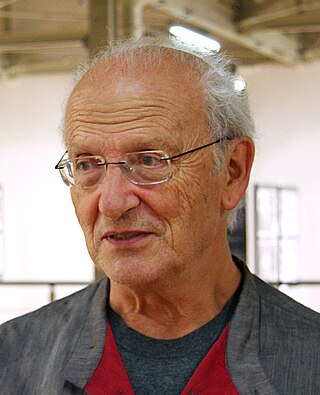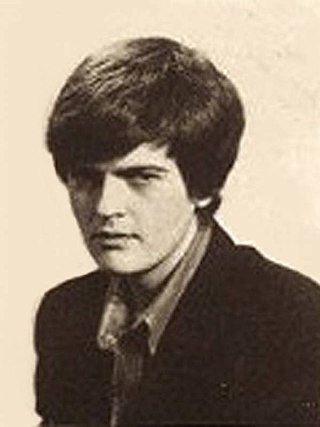
Jean Henri Gaston Giraud was a French artist, cartoonist and writer who worked in the Franco-Belgian bandes dessinées (BD) tradition. Giraud garnered worldwide acclaim predominantly under the pseudonym Mœbius for his fantasy/science-fiction work, and to a slightly lesser extent as Gir, which he used for the Blueberry series and his other Western themed work. Esteemed by Federico Fellini, Stan Lee, and Hayao Miyazaki, among others, he has been described as the most influential bande dessinée artist after Hergé.

Ugo Eugenio Prat, better known as Hugo Pratt, was an Italian comic book creator who was known for combining strong storytelling with extensive historical research on works such as Corto Maltese. He was inducted into the Will Eisner Award Hall of Fame in 2005, and was awarded the 15th anniversary special Grand Prix de la ville d'Angoulême at the Angoulême Festival. In 1946 Hugo Pratt became part of the so-called Group of Venice with Fernando Carcupino, Dino Battaglia and Damiano Damiani.

Barbarella is a fictional heroine in a French science fiction comic book created by Jean-Claude Forest.

Giovanni Papini was an Italian journalist, essayist, novelist, short story writer, poet, literary critic, and philosopher. A controversial literary figure of the early and mid-twentieth century, he was the earliest and most enthusiastic representative and promoter of Italian pragmatism. Papini was admired for his writing style and engaged in heated polemics. Involved with avant-garde movements such as futurism and post-decadentism, he moved from one political and philosophical position to another, always dissatisfied and uneasy: he converted from anti-clericalism and atheism to Catholicism, and went from convinced interventionism – before 1915 – to an aversion to war. In the 1930s, after moving from individualism to conservatism, he finally became a fascist, while maintaining an aversion to Nazism.
Éric Losfeld was a Belgian-born French publisher who had a reputation for publishing controversial material with his publishing imprint Éditions Le Terrain Vague.
Hara-Kiri was a monthly French satirical magazine, first published in 1960, the precursor to Charlie Hebdo. It was created by Georges Bernier, François Cavanna and Fred Aristidès. A weekly counterpart, Hara-Kiri Hebdo, was first published in 1969.
Stefano Tamburini was an Italian graphic artist, comics author and magazine publisher. Tamburini is primarily known as co-creator of the comic book character RanXerox, with Tanino Liberatore. Along with Andrea Pazienza, he is considered one of the most brilliant Italian comics authors from his generation.
French Renaissance literature is, for the purpose of this article, literature written in French from the French invasion of Italy in 1494 to 1600, or roughly the period from the reign of Charles VIII of France to the ascension of Henry IV of France to the throne. The reigns of Francis I and his son Henry II are generally considered the apex of the French Renaissance. After Henry II's unfortunate death in a joust, the country was ruled by his widow Catherine de' Medici and her sons Francis II, Charles IX and Henry III, and although the Renaissance continued to flourish, the French Wars of Religion between Huguenots and Catholics ravaged the country.

The International Network of Disney Universe Comic Knowers and Sources (I.N.D.U.C.K.S.) or Inducks is a freely available database aiming to index all Disney Universe comics ever printed in the world, created and maintained by both amateurs and professionals. It is an international project which provides indexes of around 170,000 Disney comic publications worldwide. It is distributed with its own licence.

Tiziano Sclavi is an Italian comic book author, journalist and writer of several novels. Sclavi is most famous as creator of the comic book Dylan Dog in 1986, for Italian publishing house Sergio Bonelli Editore. More than 300 issues have appeared in the series, which has sold millions of copies. It has been in collaboration with several artists, including Claudio Villa, Corrado Roi, Gustavo Trigo, Carlo Ambrosini, Luigi Piccatto, Angelo Stano, Mike Mignola, Andrea Venturi, Giampiero Casertano and Bruno Brindisi.

Vartan is an Italian comic book created and drawn by Sandro Angiolini, and published in 200 issues between October 1969 and May 1977 by Furio Viano. An attempt to relaunch the publication in 1980 lasted only six issues. The comic book featured the erotic adventures of its heroine, described as "white Indian", in a classic western setting. The title character's name and features were loosely inspired by French singer and actress Sylvie Vartan, at the time quite popular in Italy thanks to a number of hits and television appearances.
Topolino is an Italian digest-sized comic series featuring Disney comics. The series has had a long running history, first appearing in 1932 as a comics magazine. Since 2013, it has been published by Panini Comics.
Guy Peellaert was a Belgian artist, painter, illustrator, comic artist and photographer, most famous for the book Rock Dreams, and his album covers for rock artists like David Bowie and the Rolling Stones. He also designed film posters for films like Taxi Driver (1976), Paris, Texas (1984), and Short Cuts (1993). The band Frankie Goes to Hollywood took their name from Peellaert's painting, titled Frank Sinatra, which featured the headline "Frankie Goes Hollywood".

Alessandro Barbero is an Italian historian, novelist and essayist.

Kim Thompson was an American comic book editor, translator, and publisher, best known as vice president and co-publisher of Seattle-based Fantagraphics Books. Along with co-publisher Gary Groth, Thompson used his position to further the cause of alternative comics in the American market. In addition, Thompson made it his business to bring the work of European cartoonists to American readers.

Dick Fulmine is the title character of an action comic book series. He was created in 1938 by the sports journalist Vincenzo Baggioli (writer) and Carlo Cossio (artist).

Butcher Billy is a Brazilian artist and graphic designer known for his art pieces and illustration series based on the contemporary pop art movement. His work has a strong vintage comic book and street art influence while also making use of pop cultural references in music, cinema, art, literature, games, history and politics. Often crossing reality and fiction, his projects promote creative concepts that reference fictional characters with real life personalities such as musicians, artists, historical figures and politicians.

Big Sleeping is an Italian noir-humorous comic series created by Daniele Panebarco.

Daniel Azulay was a Brazilian visual artist, comic book artist, and educator, with vast and diverse performance in the press and on TV as a draftsman. He is most known for the children's franchise Turma do Lambe-Lambe. He died during the COVID-19 pandemic due to complications brought on by COVID-19.

Il dio vagabondo is the third comic book by the Italian writer and artist Fabrizio Dori, published by Oblomov Edizioni in 2018. The story combines a modern setting with Greek mythology and switches between burlesque humour and dramatic content. It follows the satyr Eustis who teams up with an elderly professor and a ghost as he goes on a quest for redemption after the gods have disappeared.














